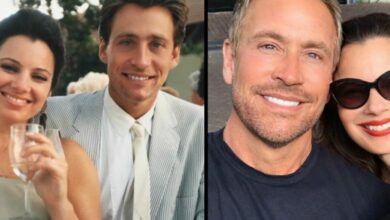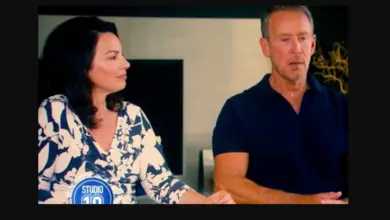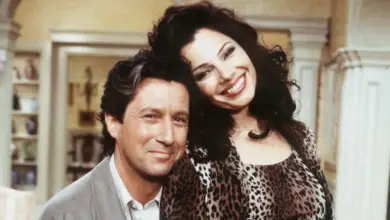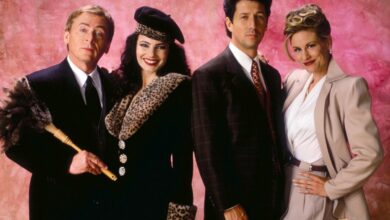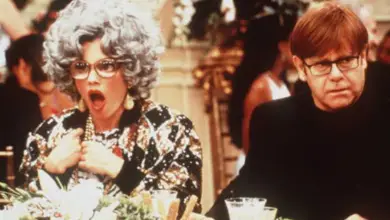Fran Drescher Knows She’s an Instagram Fashion Icon
As she returns to the small screen with Indebted, the flashy girl from Flushing reflects on her TV legacy, beating cancer, and her famous wardrobe.
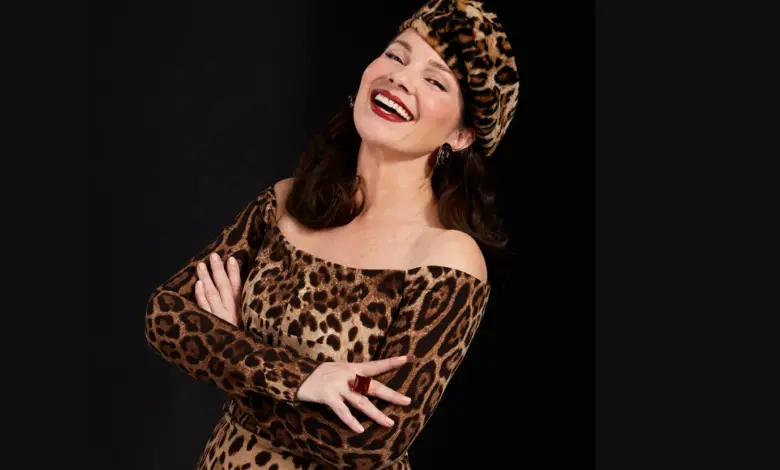
Fran Drescher looks dressed for breakfast at the Sheffield residence. There’s no snarky butler, privileged children, or thespian heartthrob in sight, but here’s Fran, glamorously cross-legged in a robe—signature morning attire for her iconic TV persona, Fran Fine of The Nanny. She extends a freshly manicured hand to shake mine; she introduces herself with that same iconic voice I grew up hearing on television.
It’s been more than 20 years since The Nanny aired its final episode in 1999, but its legacy lives on through the memory of Drescher’s nasally laugh and, among millennials, her kaleidoscopic wardrobe. It takes just a few scrolls to find an Instagram homage to her on-screen attire, and in an era when ‘90s fashion is back in full swing, Fran’s sartorial sense is extremely on trend: miniskirts, coordinates with crop tops, turtlenecks under bright fur coats, miniature sunglasses, thick headbands, feathered collars and sleeves, oversized blazers, and a whole lot of leopard. (Or, as she says it on the set of her BAZAAR.com photo shoot, “Leh-puhd, bay-by!”)
Drescher, 62 years young with more than 315,000 Instagram followers, has seen the fashion tributes online. “It makes me happy,” she says. “I mean, it’s like, I don’t know if social media and the Internet didn’t explode right after The Nanny happened, would anybody still really be talking about it?”
Drescher created the hit sitcom with her then-husband and producer, Peter Jacobson (she refers to him as “my gay ex-husband”). The show—about a sassy woman from Flushing, Queens, who serendipitously becomes the nanny of a Broadway director’s three children—debuted on CBS in 1993 and ran for six seasons, catapulting Drescher into superstardom.
“We come from very humble beginnings and really didn’t have any connections,” she says of her and Jacobson’s brainchild. “It’s just, we had ambition and I came up with a good idea and we ran with it and now it’s just become such classic television.” She later adds, “I mean, if I never did anything else in my career, just having done that would have been the bull’s-eye anyway.”
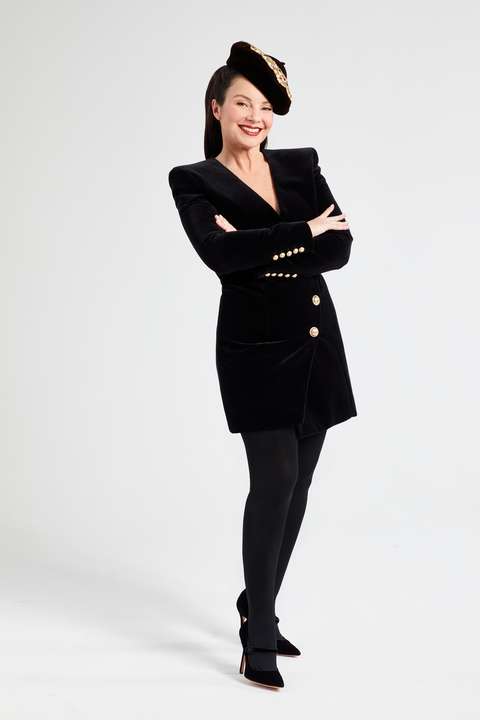
You can thank costume designer Brenda Cooper, who Dresher met on the short-lived sitcom Princesses, for the spectacle of Nanny Fine’s wardrobe. “She knew how to read a script and imagine how that could be beautifully articulated through clothes,” Drescher recalls. The pair would meet for weekly, three-hour sessions to hash out Fran’s outfits, and the pieces rarely stayed as is. “We’d modify things. We’d add buttons where there weren’t. We’d put trim on where there wasn’t.” Anything that made the attire “more Nanny-ish.”
Today, Drescher can’t pick a favorite Fran Fine outfit. “The black turtleneck and the hot pants and high heels with the chain belt was a classic look, but then I wore so many gowns coming down the stairs, feeling like Audrey Hepburn,” she says. Other standouts were by Moschino or Dolce & Gabbana, ensembles with youthfulness and humor. “The thing about The Nanny was she was sexy, but she wasn’t slutty,” Drescher says. “That was a very fine line that we never crossed.”
Now, Drescher and Jacobson are turning the beloved series into a Broadway musical. They wrote the book, Crazy Ex-Girlfriend’s Rachel Bloom is composing, and Beautiful: The Carole King Musical’s Marc Bruni is directing. The production condenses six years of small-screen entertainment into two and a half hours onstage, but it’ll offer a more encompassing perspective of the Nanny world that the live studio set couldn’t accommodate, like Mr. Sheffield’s theater productions, his full household staff, and the townspeople of Flushing.
Drescher is quite the theater fan. She raves about recent productions she’s seen, like the Alanis Morissette jukebox musical, Jagged Little Pill—“I absolutely love that album”—and The Inheritance, a two-part, generation-spanning play about the gay experience in New York, which she watched with her pal Rosie O’Donnell the night before our chat. But has she seen the film Cats? “No, sorry,” she chuckles.
The thing about The Nanny was she was sexy, but she wasn’t slutty. That was a very fine line that we never crossed.
On the Sunday after the shoot, Drescher phones me from her New York City apartment at noon. By then, she’s already had reflexology (“which I absolutely love”), DVR-ed CBS Sunday Morning (her weekend ritual), and texted her mom to learn that a girlfriend’s dog died the day prior. “That’s the thing about dogs,” Drescher says, pulling food out of the fridge to munch on while we talk. “They’re like these little angels when they come into your life, but they don’t stay as long as you want them to.” The actress herself is a dog mom to a pint-sized fur ball and travel companion named Samson.
Like Nanny Fine, Drescher grew up across the East River in Flushing. She met Jacobson in high school when she was 15, and wed him at 21. They were married for 20 years. Now two decades after their split, they’re on great terms and working together again to bring The Nanny to the stage. “We both figured ourselves out,” she explains. “We’re both living our truth and what makes us happy. We’ve been in therapy. We know how to express ourselves. We have more of a trust in our talents and our ability and our experience.”
The evidence is all over their Instagrams, with joint vacation snaps and party photos. “We’re best friends and we’re family and we love each other very much,” she says. “I think we’re very grateful that we have each other, and I think maybe that’s why neither one of us is in another relationship, because we still love each other.”
But that wasn’t always the case. “Peter was very upset with me for leaving him,” Drescher recalls. “He felt very abandoned by me, and for me, it was like walking through fire to put my needs over somebody else’s, especially if it was hurting them. But I knew I had to.” They didn’t speak for years after the divorce, until Jacobson learned of Drescher’s uterine cancer diagnosis in the early 2000s. “We had the same manager and she called him and he burst into tears. And in that moment, all of his anger melted away, and all that was left was the love,” she says. “The silver lining of my cancer was that we found each other again and put our relationship on a new shelf.”
Drescher remarried briefly, to tech entrepreneur Shiva Ayyadurai, but they parted ways in 2016 (which she announced on Instagram). Now, the actress is in a relationship with herself, and “it’s going quite well,” thank you very much. She realized that her need for having a partner was fueled by a fear of being alone, getting older, and “wanting to find someone while you’re still kind of young and hot,” she reveals. “All not the right reasons.” She’s over that now.
“I’ve never really been as independent as I am now. It’s taken me my whole life to get to this place,“ Drescher explains. “For me to face my fears and live alone and be comfortable in my own skin and enjoy my life on my own is huge for me. When you really do arrive at that place where you really kind of enjoy your own company, the urgency to be in a relationship kind of fades.”
She did attempt online dating through Raya, which is basically Tinder for famous people, and connected with three guys. But two of them smoked cigarettes, and the other misrepresented himself online, she admits defeatedly. “It’s not for me,” she sighs. She’d rather meet someone in person or have a friend set her up.
As for her own social media use, Drescher stays online to connect with her fans. But if you’re a friend, don’t expect her to look through your baby photos. “If you know me, you’ll know to text me,” she says.
Drescher will be 20 years cancer-free on June 21, “which poetically is the longest day of sunlight.” In the first two years of her illness, she didn’t even know she was sick. She went through eight doctors before being diagnosed with uterine cancer. Before that, she was misdiagnosed with perimenopausal symptoms. “I was lucky only in the sense that I had a very slow-growing cancer,” she says. But if the disease had metastasized faster, “I would’ve been screwed. I might not be talking to you today.”
Feeling let down by the traditional medical industry, Drescher turned her recovery into a whole lifestyle movement. She founded the nonprofit Cancer Schmancer, which focuses on prevention, early detection, and policy change. It includes an annual summit with “outside-of-the-box-thinking doctors,” an online masterclass and educational video series, and “Fran vans” to transport low-income women to preventive screenings.
“I honestly feel like I got famous, I got cancer, and I lived to talk about it. So I’m talking,” she says. “And I’m the type of person that’s always trying to crack the code, reinvent the wheel, come up with a new system, and not be complacent—not be accepting of the status quo.”
Unlike other medical organizations that target treating the sickness, Drescher focuses on environmental factors and exposure to potentially harmful materials like radiation, toxic foods, and plastic packaging. (“Plastic is the worst!”) On a personal level, she turns off her Wi-Fi at night, doesn’t have a microwave, takes vitamins from glass bottles, puts her phone on airplane mode, and avoids 5G service. She denounces the role big businesses play in the health care and food industries. She once refused a half-million-dollar commercial deal for KFC, because she felt it contradicted her public stance on eating clean and organic. “You know, I could have used that money, but I turned them down,” she recalls.
Drescher’s health efforts have even taken her to Washington. She lobbied for a national campaign to raise awareness on gynecological cancers and worked as a U.S. public diplomacy envoy to raise awareness about cancer detection in foreign countries. The woman is unstoppable.
But when she was in her 20s, before her Nanny fame, Drescher underwent a traumatic experience that brought her life to a screeching halt. A man on parole broke into her and Jacobson’s home, and raped her at gunpoint. At that time in the ’80s, it was long before the #MeToo movement, but the actress worked with authorities to find and capture the man who attacked her. He’s now serving a lifetime sentence in jail. The actress feels “lucky” to have that kind of closure. Not all sexual assault survivors get to.
Drescher knows how powerful it is for survivors to come forward with their experiences. She opened up about her assault in a chapter from her book, Enter Whining, and when she went on tour, fans would approach her, open to that page, and ask her to autograph it.
“The more we talk about it, the more we take the curse off of this, because it’s out of the closet. People have to think twice about their behavior,” she says. She invokes the movie Bombshell, which she saw recently. “One got brave, and then one by one they all stood up against the powers that be,” she says. “And listen, Shakespeare said it best: Kings fall.”
I honestly feel like I got famous, I got cancer, and I lived to talk about it. So I’m talking.
Tonight, Drescher returns to TV in NBC’s Indebted, a new sitcom about a broke couple who crash with their son and daughter-in-law. Show creator Dan Levy (The Goldbergs) knew from the start that he wanted a “Fran Drescher type” to star as the mother, Debbie, Drescher reveals. So why not try for the role herself? “Peter and my parents both were like, ‘Yes, do it. You need to be back on the air. We love NBC. Nobody could find TV Land.'”
Drescher’s 90-year-old father and 85-year-old mother were big influences on the decision. “When your parents are my parents’ age already, you have a hyper-awareness of how ephemeral your time with them is,” she says. “And so this is giving them a shot in the arm. They’re so excited.”
After The Nanny, Drescher starred in Living with Fran (2005-07) and Happily Divorced (2011-13). There were talks of a sitcom, The New 30, with O’Donnell and even her own talk show, but neither took off. There were movie roles in between too. Seven years after her last series, Drescher felt it was time to get back in the game. “If I’m going to do it, I should do it now and have one more big ride and make one more chunk of money and set myself up for my old age even a little more securely, and all these things that go through your head,” she says.
Drescher has no regrets when she looks back at her career. Beyond the screen, she points to accomplishments like writing New York Times best-selling books, her success in Washington, directing, writing, producing, and personal milestones like going to therapy, self-refinement, and practicing Buddhism. “I’m a Bu-Jew,” she quips.
But she does wonder what might’ve been if her life played out differently. “If anything, I might think … I never had children, and I don’t really know what that experience is,” she says. “And maybe I couldn’t have had children and had the accomplishments that I’ve had without sacrificing one over the other. I always knew that with kids, if you don’t put 150 percent of yourself into it, you’re going to pay a big price.”
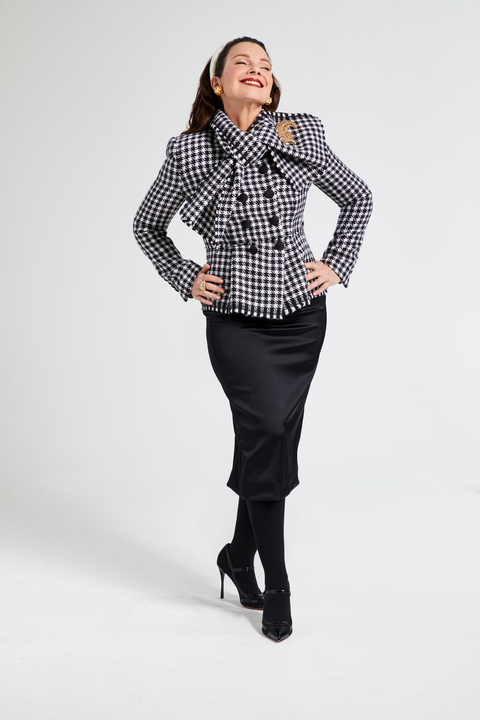
When asked about the obstacles she’s faced in her tenure, Drescher assures, “Not the voice.” She’s been typecast into comedic roles because of it, but that didn’t bother her because she believed in her characters. “Each one is a different human being to me,” she says. “And even if I were challenged to play extremely different roles, like a Meryl Streep or a Leonardo DiCaprio, I would still probably be bored just acting.” In fact, the true obstacle might’ve been being overqualified. “I started to feel like I was unhappy working for people that I didn’t feel were as talented as I was,” she says. “Peter and I always felt like I have what it takes to be a star, and we know better than anyone how to create something that’s going to fit me hand in glove.”
In contrast to her unwavering confidence, I bring up the concept of imposter syndrome and how young women are often plagued with the fear that everyone in the room is smarter or more experienced than they are, when in reality, everyone is just faking it until they make it.
Drescher advises, “I think that sometimes you have to really talk yourself off the ledge and say, ‘These people are no better than you.’ And you have to walk in with a tremendous amount of bravura, even if it’s an act at first.”
Even she had to prove herself at one point. “In the beginning, it was only me in my head that knew I could do it. So you have to walk in with the attitude as if you belong there. You deserve this, and you’re as good as it gets.”

